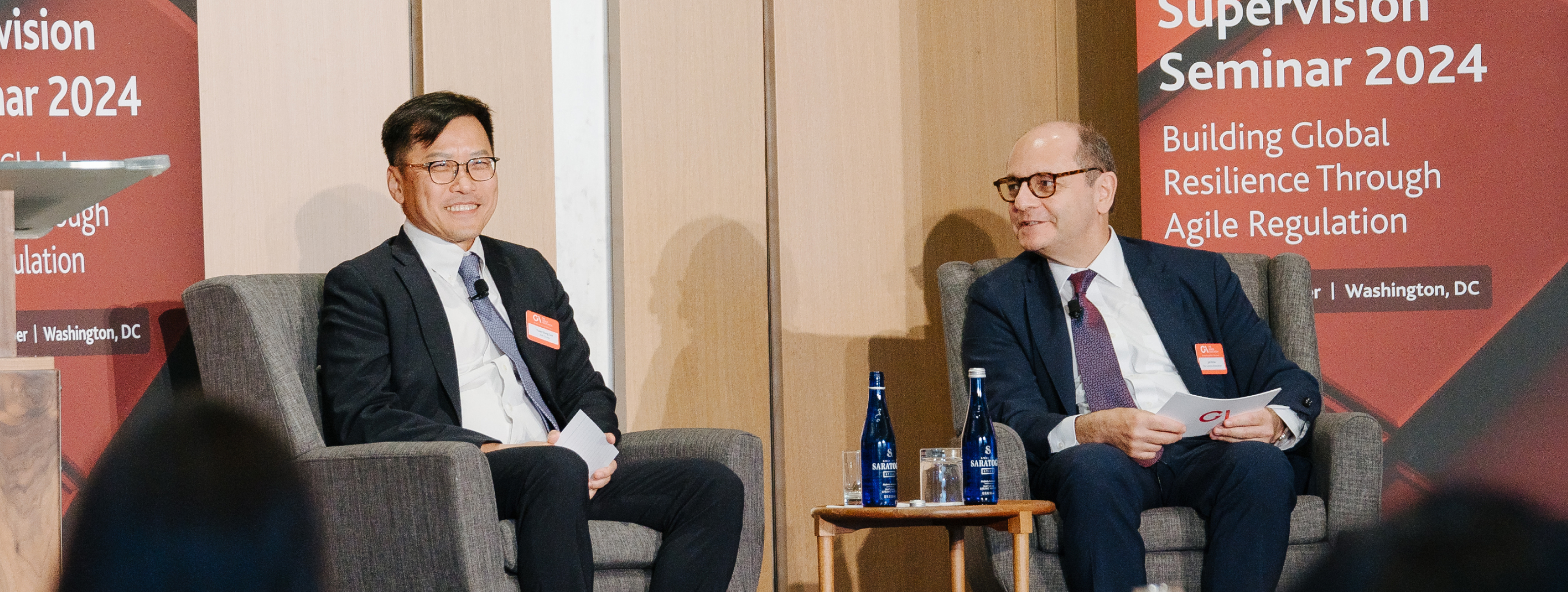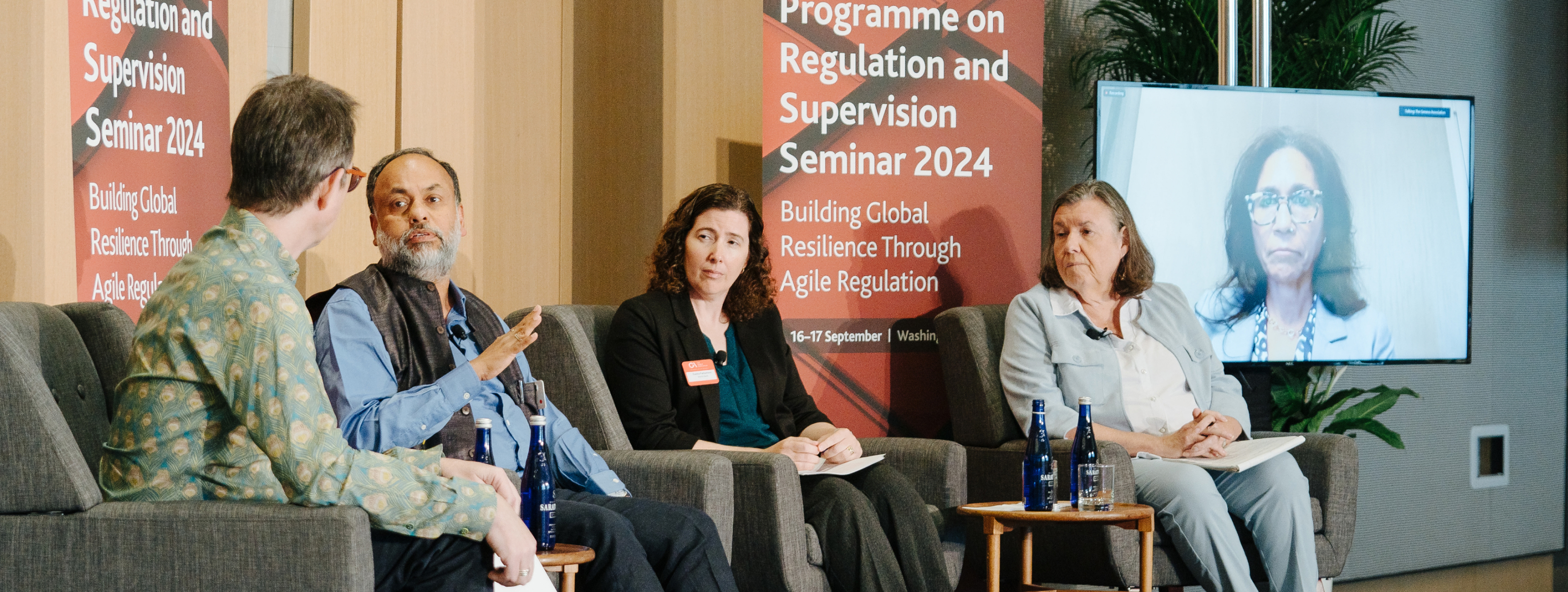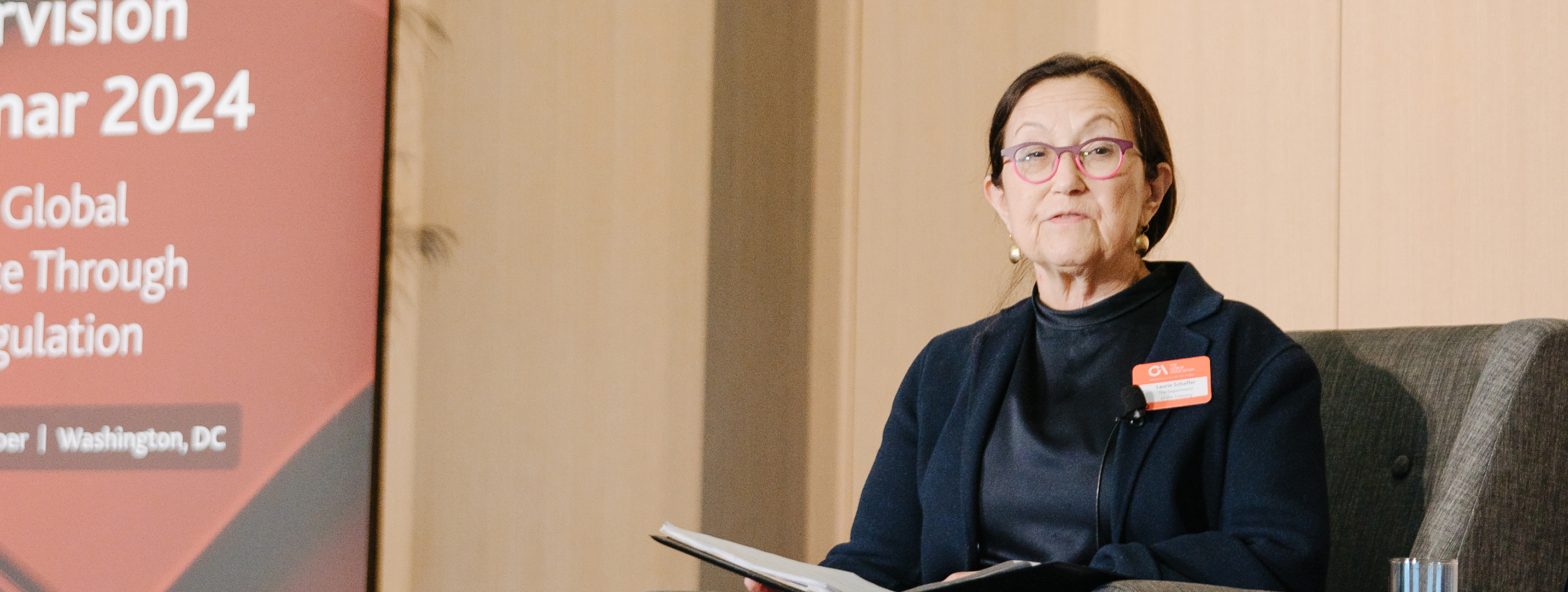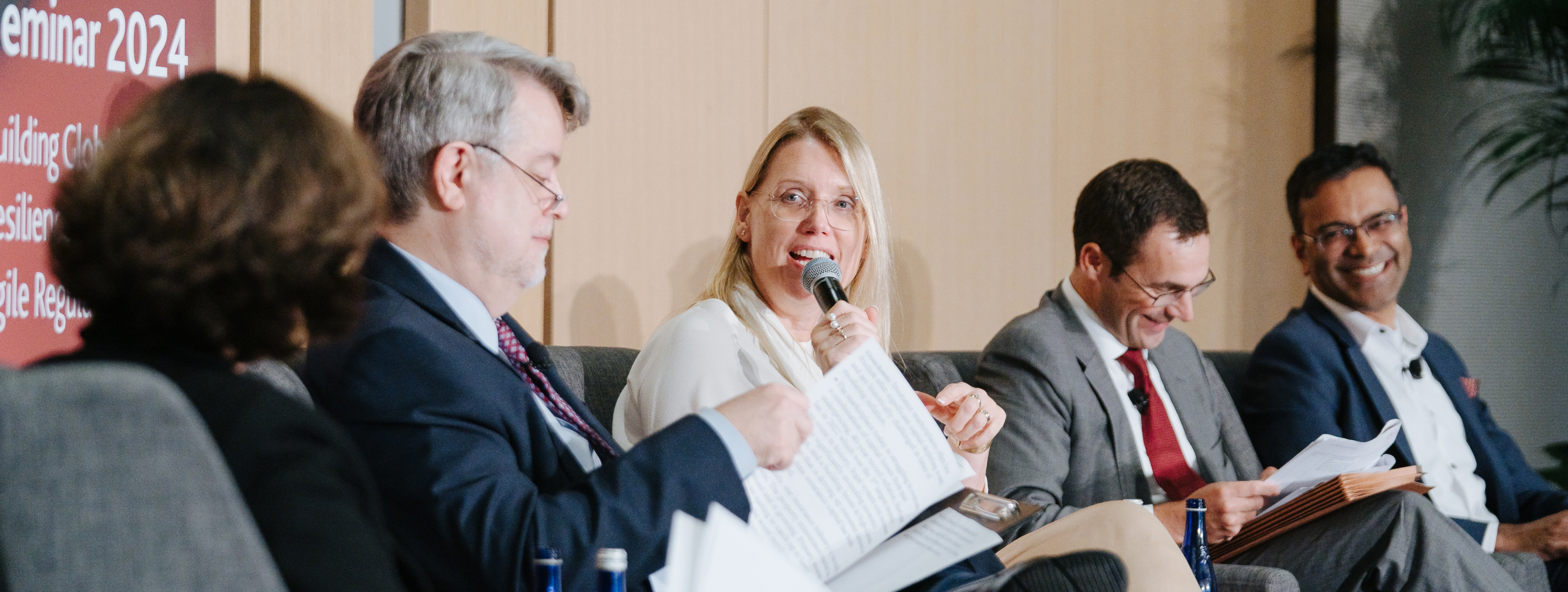Washington DC., US
Building Global Resilience through Agile Regulation
The Geneva Association's 2024 Programme on Regulation and Supervision (PROGRES) Seminar took place on 16–17 September 2024 in Washington, DC.
The PROGRES Seminar is an annual conference which convenes insurers, policymakers, regulators and supervisors to discuss key issues facing the regulatory community, insurers and their customers.
Keynote speech and fireside chat: Lee Yuan Siong

Lee Yuan Siong, Group Chief Executive & President, AIA and Chairman, Geneva Association; Jad Ariss, Managing Director, Geneva Association
Insurance plays a crucial role in enabling economic growth, promoting financial market stability and acting as a social safety net. Four major trends are shaping the industry: climate change, increased longevity and related health challenges, widening protection gaps and rapid technological advancements.
Public-private partnerships are pivotal in addressing these challenges, particularly climate change mitigation and adaptation. Innovative risk management frameworks and insurance solutions are needed to mobilise capital for new climate technologies. On the health front, programmes which integrate health and wellness incentives with insurance products can result in improved health outcomes for customers.
Session 1: Bridging Protection Gaps – Advancing inclusive insurance solutions

Felix Salmon, Chief Financial Correspondent, Axios; Brenda Cude, Professor Emeritus, University of Georgia; Salene Hitchcock-Gear, President, Individual Life Insurance, Prudential Financial; Debasish Panda, Chairperson, Insurance Regulatory and Development Authority of India (IRDAI); Danita Pattemore, Senior Financial Sector Specialist, World Bank
The panel discussion focused on addressing protection gaps and promoting inclusive insurance solutions globally. Panellists emphasised the need for innovative approaches to reach underserved populations, with tailored approaches for mature and emerging markets. Low insurance awareness, affordability issues and lack of trust in insurers are key challenges.
Panellists highlighted the importance of designing products tailored to specific consumer needs and local contexts, rather than simply extending existing offerings. Digital platforms and technology are crucial enablers for expanding insurance access; this is inspiring India's vision for a comprehensive digital insurance marketplace.
Panellists stressed the importance of timely, relevant and well-designed financial literacy and educational initiatives. Community-based approaches and ‘influencers’ have significant potential to build trust and awareness.
Regulatory frameworks should strive for a balanced approach that both encourages innovation and ensures consumer protection. Progress relies on strong public-private partnerships and collaboration between insurers, regulators and other stakeholders.
Keynote speech: Shigeru Ariizumi

Shigeru Ariizumi, Chair of the IAIS Executive Committee
After having implemented the holistic framework for assessing and mitigating systemic risk, which proved effective during the COVID-19 pandemic, the IAIS is now finalising the Insurance Capital Standard (ICS) for internationally active insurance groups (IAIGs), which will provide a common language for cross-border solvency discussions. Since then, the IAIS has finalised and adopted the ICS as a prescribed capital requirement for IAIGs during its Annual General Meeting in Cape Town in December 2024.
Looking ahead, the IAIS's 2025–2029 Strategic Plan focuses on three main themes: 1) strengthening the supervisory response to climate change, 2) supporting adaptation to digital innovation and cyber risks, and 3) supporting insurance to serve its societal purpose of building resilience.
The IAIS has significantly increased its focus on climate-related risks in recent years and will finalise its comprehensive climate package with a final Application Paper in April 2025 to support supervisors in responding to climate related risks. An application paper on artificial intelligence was published for public consultation in November 2024.
The IAIS is collaborating with stakeholders to improve availability, affordability and uptake of insurance. This includes efforts to assess protection gaps, improve financial literacy, incentivise risk prevention, create enabling regulatory environments and advise on public-private partnerships.
Keynote speech: Patrick McHenry

Patrick McHenry, Chairman, House Financial Services Committee, House of Representatives
A balanced approach to financial regulation is needed, particularly in the insurance sector. Three key pillars help build a robust insurance market: competition, choice and innovation.
The U.S. insurance regulatory framework, characterised by its state-based model, has proven resilient and effective over the past 150 years. This decentralised approach has fostered a diverse and stable marketplace, benefiting both policyholders and consumers. Despite global economic challenges, the American insurance industry has remained consistent and stable, with fewer impairments compared to the banking sector.
However, the industry faces ongoing challenges, including rising costs due to inflation and increasing claims from natural disasters. Regulatory policies should not be short-sighted, as this constrains sound pricing and requires unrealistic coverage terms.
Insurers should embrace technological advancements, particularly AI. These tools can enhance risk assessment, improve product offerings and ultimately benefit consumers. Regulators should adapt to these innovations rather than impede their implementation.
Greater clarity on the decision-making processes of global standard-setting bodies would improve transparency and accountability.
Session 2: Navigating Geo-economics in a Fragmented World

Kai-Uwe Schanz, Deputy Managing Director, Head of Research & Foresight, Geneva Association; Elisabeth Braw, Senior Fellow, Atlantic Council; Clement Cheung CEO, Hong Kong Insurance Authority; Brad Irick, Co-Head of International Business, Tokio Marine; Victor Ban, Special Counsel, Office of the U.S. Trade Representative
This panel explored the implications of geoeconomic fragmentation, defined as a slowdown or reversal of global economic integration driven by political decisions. Key drivers include eroding public support for globalisation since the 2008 Financial Crisis, U.S.-China trade tensions and supply-chain vulnerabilities exposed by the COVID-19 pandemic.
The insurance industry faces both threats and opportunities from fragmentation. Reduced scope for international risk diversification could increase costs, potentially widening protection gaps. However, insurers can play a vital role in building resilience by incentivising risk mitigation, enhancing early-detection capabilities and collaborating with clients to demonstrate resilience.
Panellists emphasised the need for ‘smart and friendly’ supervision that balances risk-based approaches with market understanding. International regulatory coordination remains crucial, even as fragmentation complicates global standard-setting. Public-private partnerships are essential for addressing emerging risks and preserving resilience.
While multilateral institutions face challenges in a more fragmented world, they continue to be important. There may be a shift towards more regional alliances and groupings, but global bodies remain necessary for addressing shared challenges like climate change and cyber risks.
Keynote speech: Laurie Schaffer

Laurie Schaffer, Acting Assistant Secretary for Financial Institutions, U.S. Department of the Treasury
Climate change poses significant challenges to the insurance sector, impacting affordability and accessibility for homeowners. The Federal Insurance Office (FIO) is assessing climate-related financial risks, analysing homeowners’ insurance data at the postal-code level, with a report expected by the end of 2024. This initiative aims to understand trends in climate-affected areas and address affordability issues, particularly for low-income households.
On cybersecurity, the Treasury is exploring possible federal insurance responses to catastrophic cyber incidents, working with agencies to develop strategies that stabilise the economy and aid recovery in such events. They released a report on AI applications in cybersecurity and fraud prevention.
Internationally, the Treasury leads the International Forum of Terrorism Risk (Re)Insurance Pools (IFTRIP) and represents the U.S. in the IAIS, focusing on the ICS and related global frameworks.
Finally, the Treasury is crafting a national financial inclusion strategy to promote equitable access to financial products, recognising that affordable insurance is critical to financial resilience.
Sesson 3: Increased Investment in Alternative Assets: A blessing or a curse?

Scott White, Commissioner of Insurance, Bureau of Insurance of Virginia; Chuck Scully, EVP & CIO, MetLife; Nobuyasu Sugimoto, Deputy Division Chief, International Monetary Fund; Craig Swan, CEO, Bermuda Monetary Authority; Suzanne Williams-Charles, CEO, Biltir
This session explored insurers’ increasing investments in alternative assets, driven by persistent low yields and the involvement of private equity in the insurance sector. While alternative assets offer potentially higher returns, they come with increased liquidity and valuation risks. Regulatory frameworks are evolving to address these risks, with a focus on transparency, risk-based capital requirements and group supervision. Coordination among regulators is needed on this matter.
Private-equity involvement has influenced investment strategies and risk-management practices, with firms leveraging their asset origination capabilities.
Looking ahead, alternative assets will likely continue to play a significant role in insurance portfolios. There is a need to balance regulatory scrutiny and prudent risk management with innovation. Enhanced education on and understanding of alternative assets in the insurance industry would support effective risk management.
Keynote speech: Bjorn Lomborg

Bjorn Lomborg, President, Copenhagen Consensus Center
Climate change is a real and man-made phenomenon, but its impacts are often exaggerated and presented in a one-sided manner. Some climate-related issues, such as wildfires and deaths from temperature extremes, have actually improved or remained stable over time. Human adaptation has significantly reduced climate-related deaths and economic losses as a percentage of GDP, which corrects for population growth and increased wealth.
Current climate policies are costly and ineffective. Studies suggest that the benefits of aggressive emissions-reduction strategies like ‘net zero by 2050’ are outweighed by their economic costs. Increased investment in green-energy innovation is a more cost-effective approach to addressing climate change.
Session 4: Keeping People Protected Against Climate Risks

Maryam Golnaraghi, Director Climate Change & Environment, Geneva Association; Robert Gordon, Senior Vice President, Policy, Research & International, APCIA; Petra Hielkema, Chairperson, EIOPA; Alice Kane, Superintendent of New Mexico; Steven Seitz, Director, Federal Insurance Office, U.S. Department of the Treasury; Raghuveer Vinukollu, Head, Climate Insights & Advisory, Munich Re
As climate risks intensify, insurers are facing increasing losses, leading to reduced availability and affordability of coverage in high-risk areas. This is leading to increasing protection gaps, particularly for homeowners in vulnerable regions.
Addressing these challenges requires improved risk assessment and communication, enhanced risk mitigation and prevention measures, the development of innovative insurance products and public-private partnerships, as well as increased collaboration between insurers, regulators, policymakers and communities.
Public policy plays a critical role in incentivising investment in risk mitigation and resilience. Data-driven decision-making and better integration of climate-risk information into urban planning and development is important.
Despite challenges, there are signs of progress, such as the recent reforms in Florida that have led to increased market participation.






